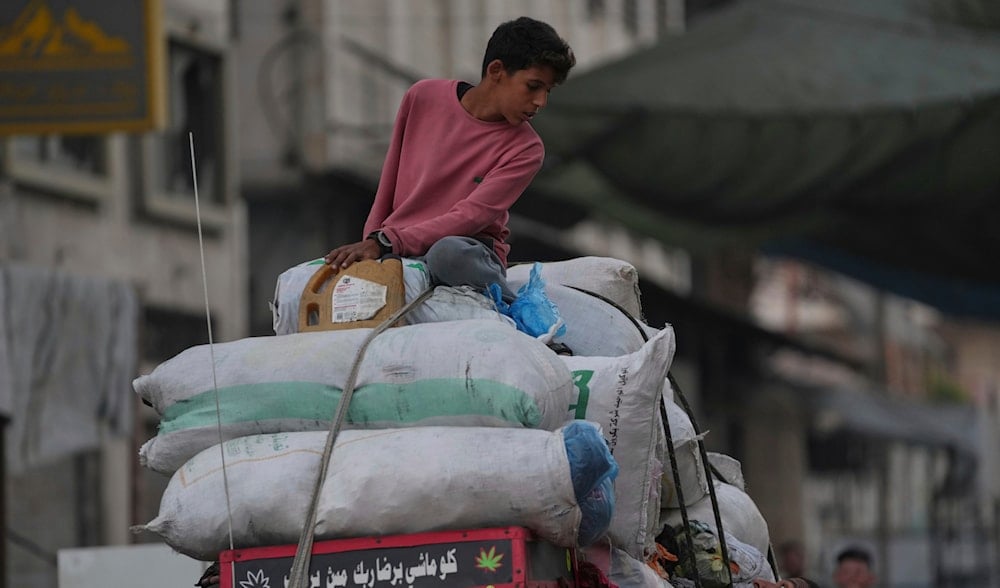'Israel' accuses UN-backed org. of Hamas bias amid Gaza famine report
"Israel" urges UN-backed IPC to retract its Gaza famine report, accusing it of bias amid widespread hunger and obstruction of aid deliveries.
-

Displaced Palestinians fleeing Jabalia move with their belongings on a street in Gaza City, Tuesday, Aug. 26, 2025. (AP Photo/Jehad Alshrafi)
The Israeli regime on Wednesday called on the UN-backed Integrated Food Security Phase Classification (IPC) to retract its recent Gaza famine report, which found famine present in parts of the besieged Palestinian territory.
Eden Bar Tal, Director General of the Israeli Foreign Ministry, claimed the report was “fabricated” during a press conference, stating, “Israel demands that the IPC retract immediately its fabricated report and publish a notice.”
He added that if the organization fails to comply “within a short time,” the Israeli occupation would share what it claims to be “evidence” of misconduct in the preparation of the report with IPC donors.
Bar Tal went further, calling the IPC a “politicized” institution allegedly “working for an evil terror organisation,” in reference to the Palestinian Resistance Hamas.
Famine declared in Gaza as aid blockade continues
The United Nations officially declared a famine in Gaza on Friday, attributing it to the systematic obstruction of aid by the Israeli regime over the course of the war, which has now lasted more than 22 months.
The IPC, based in Rome, reported that famine is already affecting approximately 500,000 people in the Gaza governorate, which includes Gaza City. The agency projected that famine conditions would likely expand into Deir al-Balah and Khan Younis by the end of September, eventually covering nearly two-thirds of the Gaza Strip.
"Israel" has imposed severe restrictions on the entry of humanitarian aid into Gaza, completely halting its flow. The ongoing aid blockade on Gaza has exacerbated the humanitarian crisis and sharply limited access to food, water, and medical supplies.
UN, WFP defend IPC report on Gaza food crisis
In response to the Israeli occupation's criticism, Jean-Martin Bauer, director of the UN World Food Programme’s food security analysis, defended the IPC’s findings. He emphasized that the IPC represents the “gold standard” for such assessments and reaffirmed the organization’s methodology and integrity.
COGAT, a body under "Israel's" security ministry overseeing civil affairs in the occupied Palestinian territories, rejected the report, claiming it relied on “partial data and unreliable sources.” Israeli Prime Minister Benjamin Netanyahu also dismissed the IPC findings, labeling them an “outright lie,” and insisted that "Israel" does not maintain a policy of starvation.
Netanyahu cited figures on aid shipments allowed into Gaza as proof of humanitarian considerations, despite widespread international criticism over the continued obstruction of aid convoys at the hands of the Israeli occupation.
The IPC’s projections suggest that the food crisis in Gaza is set to worsen, threatening to engulf larger parts of the territory. As the war drags on and reconstruction efforts remain paralyzed, experts warn that continued inaction will deepen the suffering of civilians and further destabilize the region.
313 Palestinians starved to death
In the past 24 hours, 10 Palestinians, including two children, died from hunger and malnutrition, bringing the total number of starvation-related deaths since the start of the war to 313, of whom 119 were children.
Hospitals on Tuesday also recorded three adult deaths linked to hunger, raising concerns that famine is rapidly worsening.
The Gaza Government Media Office accused the Israeli occupation of systematically engineering starvation, noting that more than 95% of Gaza’s 2.4 million residents now had no income and cannot afford food even when limited supplies appear in markets.
It said Israeli authorities continue to close crossings, blocking the entry of 430 essential food items. Over the past 30 days, only 14% of Gaza’s required aid needs were met, leaving an 86% deficit in supplies. Aid distribution has also been obstructed, with reports of convoys being blocked or looted.
Among the food products barred from entering Gaza are eggs, red and white meat, fish, cheese and dairy products, fruit, vegetables, nutritional supplements, and fortified foods for pregnant women and chronically ill patients.
Read more: End 'Israel's' war, Gaza faces 'hell on earth': UNRWA chief

 4 Min Read
4 Min Read










